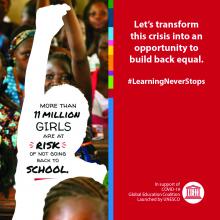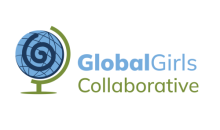As we come to grips with still emerging repercussions of the pandemic, we are learning more about the impact on women in STEM careers, as well as the consequences for girls of existing disparities in access to science, technology, and education more broadly. As we seek to promote girls and young women in STEM, there are new challenges, lessons and some opportunities that have come with this global crisis. Recently, several articles and reports have been published drawing attention to these issues and a selection of their findings follow.

As livelihoods and lives have been transformed due to COVID-19, we have seen a number of disparities and challenges specifically for women.
- COVID-19 has highlighted and exacerbated existing inequalities in girls and women in STEM and their access to science and technology.
- Women’s progress in STEM “is fragile and prone to setbacks especially in times of crisis.”
- Women dropped out of the STEM workforce or reduced hours/load and faced job insecurity
- “Preliminary evidence indicates that the COVID-19 pandemic has negatively affected the well-being of women in academic STEM fields in a range of areas, including productivity, work-life boundary control, networking and community building, and mental well-being.” There were also widespread disruptions to research work.
- Many women have faced a maternal wall and undertaken a predominant share of caretaking/domestic responsibilities. They are often left to individual coping strategies versus finding institutional responses and support thus revealing structural gaps in availability of child or elder care.
- Disparity in access to digital tools has impacted access to learning when schools are not held in person, to continued learning opportunities, to information, and to digital health care.
- Disparities and differentiated experiences in health outcomes can also be seen in access to care, as well as the impact of COVID-19 and vaccine side effects on men versus women.
- And for women and girls, there have been a number of “shadow” pandemics that have greatly increased vulnerability across many dimensions of their lives. As UNESCO states, “11 million. That’s the number of girls who might not return to school this year due to COVID-19’s unprecedented education disruption. This alarming number not only threatens decades of progress made towards gender equality, but also puts girls around the world at risk of adolescent pregnancy, early and forced marriage, and violence. For many girls, school is more than just a key to a better future. It’s a lifeline.”
However, there are also potential opportunities coming out of the pandemic, including a greater focus on health care access, ethics, and government and community response. The deep systemic challenges – in health care, safety nets and beyond - have been brought to light, which may lead to greater accountability and pressure for reform. The importance of access to technology – and digital skills - was laid bare. There are also some positives on which we can capitalize, such as (in some cases) the ability to remote work and have more flexible hours, as well as wider participation in learning and collaboration as events and projects moved online.
There are myriad of contributions that women in STEM have been making to the COVID-19 response, from vaccine development to frontline health work. This is a time to recognize these contributions and better support and reward women’s work. These women are role models for our girls and younger women, as well as advocates for a better and more responsive workforce and for taking a gender analysis when it comes to health systems. Some examples of the important women’s STEM work in the pandemic include:
- The impact of “women’s involvement in diagnostic testing, revealing the need for and benefits of women leading the development and delivery of testing and vaccines — particularly important in light of the COVID-19 vaccine and testing rollouts that the world is now undergoing. Women driving testing and implementation improves trust in testing services, expands access for women, and begins to break down the barriers to information that women experience due to inequities.”
- Frontline health workers – 70% around the world are women - and vaccine delivery.
- UN Women, UNESCO, and UNDP have highlighted a number of women that have been instrumental to the global COVID-19 response. These range from Dr Özlem Türeci, co-founder of BioNTech, which helped produce the first COVID-19 vaccine to Dr Swaminathan who was appointed the World Health Organization’s (WHO) Chief Scientist in 2019 and has been coordinating international work on vaccine development to Ramida Juengpaisal and her colleagues at web design firm 5LAB in Bangkok, Thailand, who built a tracker of COVID-19 cases, giving the city’s eight million residents up-to-date news and information about the pandemic and helping to stop the spread of misinformation.
Sources: National Academies of Science, Engineering and Medicine, The Impact of COVID-19 on the Careers of Women in Academic Sciences, Engineering, and Medicine, 2021; UNESCO, Covid-19 pandemic disproportionately affecting women in science and engineering, 2021; Scientific American, COVID Has Laid Bare the Inequities That Face Mothers in STEM, 2020; Newsweek, COVID Could Undo the Progress We Celebrate on International Day of Women and Girls in Science, 2021; World Economic Forum, Futures destroyed: COVID-19 unleashes 'shadow pandemics' on Africa's girls, 2020; UNESCO, Keeping Girls in the Picture, 2020; GSMA, Mobile Gender Gap Report 2021, 2021; Women in Global Health, Health in Their Hands: Testing & Women's Empowerment Means Better Health For All, 2020; Inside Higher Ed, COVID-19: A Moment for Women in STEM?, 2021; World Economic Forum, These 8 women in STEM are at the forefront of the world’s response to COVID-19, 2021; Medical News Today, It’s time to change the narrative: Women in COVID-19, science, and academia, 2021; UNDP, African women in STEM and their contribution to the COVID-19 emergency response, 2020; Care, 3 Reasons Why Women Health Workers are Key to COVID-19 Vaccine Access, 2021

